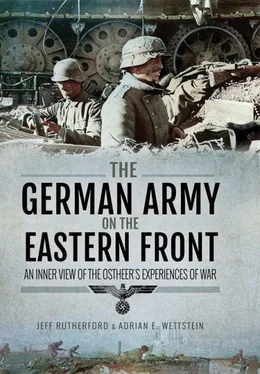[…]
21) Tiede, Berthold, Gefreiter , 5./Infantry Regiment 251. Fraud. 2 years prison. While filing an application for family support, he concealed that he received 12 RM monthly for sublease from his father and claimed a surplus amount of 352 RM. His punishment was increased due to consideration of his criminal record and the fact that he attempted during the investigation to send letters to his family in order to prompt false testimonies by his family members.
22) Jakobs, Fritz, Gefreiter , Headquarters Battery II./Artillery Regiment 183. Breach of guard regulations. 9 months prison. [He] left his guard position, allegedly to get his coat, and went to his quarters, where he was found sleeping.
23) Meyer, Walter, Unteroffizier , 5./Infantry Regiment 251. Careless handling of weapons. 2 months confinement in a fortress. [He] loaded a machine gun with live ammunition during training and carelessly fired, which severely wounded a comrade.
24) Flemming, Hans, Kanonier , 2./Artillery Regiment 183. Military theft. 5 months prison. [He] stole 2 kilo tins and four iron ration tins of meat from the provisions area.
[…]
26) Beckmann, Walter, 14./Infantry Regiment 257. Careless handling of weapons. 3 months confinement in a fortress. [He] activated a Russian hand-grenade in a closed room, which detonated due to careless handling and wounded the punished, as well as 5 comrades.
[…]
28) Buhmann, Otto, Gefreiter , 2./ Infantry Regiment 277. Military embezzlement. 6 months prison. [He] took two army postal packets for a comrade during mail distribution and stole their contents.
29) Heideman, Helmut, Unteroffizier , Headquarters Company./Infantry Regiment 251. Disobedience. 6 months prison. [He] did not carry out an order for a sentry position.
[…]
31) Dohmann, Max, Gefreiter , Butchery Company 183. Breach of guard regulations. 6 weeks confinement. [He] left his guard position in a drunken condition and lay down in a carriage 20 meters away to sober up. Mitigation was considered, in that the neighbouring sentry looked after the punished’s area.
33) Krebs, Walter, Gefreiter , 3./Security Battalion343. Falsification of documents. 3 months prison. [He] modified leave entries in his pay book to obtain preferred leave.
34) Vasterling, Heinrich, Wachtmeister , Headquarters Battery IV./ Artillery Regiment 183. Recurrence of military theft with fraud. 3 years prison and loss of rank. [He] sold his service pistol in Vilnius to a member of the Lithuanian police for 140 RM and traded another borrowed pistol with an Obergefreiter for 4 bottles of schnapps and cigarettes.
[…] Several proceedings on self-inflicted injuries have, despite strong suspicions, led to no conclusions, because a later clarification from the Replacement Army was no longer possible. Soldiers, who are suspected of self-inflicted injuries due to the nature of their wounds, are therefore held back in the divisional area until the facts of the case are clarified. Furthermore, one has to report immediately to the military tribunal when the suspicion arises of self-inflicted injuries. [50]
The infractions listed in this report highlight the various discipline issues that plagued the Wehrmacht, from mundane issues of simple thievery and improper handling of weapons, to more important offenses such as insubordination, absence without formal authorization and self-mutilation. It was the latter that most offended Nazi ideological tenets and one which the army punished fiercely, either through execution or long stints in military prisons. [51]As the war dragged on into 1944 and 1945, and a new generation of German commanders rose to positions of real power, the symbiosis of motivation, ideology, and military justice was perhaps best represented by Generalfeldmarschall Ferdinand Schörner.
Described as ‘a fanatical loyalist from ingrained Nazi conviction, a believer in “triumph of the will” and the need for a revolution of the spirit in the army,’ Schörner had deserters hanged, leaving their corpses dangling in the wind as a deterrent to others. [52]His quick recourse to terror was complemented by his belief that only through a thorough indoctrination of the men with Nazi ideological tenets could Germany win the war. The following order was issued in early 1943 when Schörner commanded a corps; by the end of the war, he had been named commander-in-chief of the German army in large part due to the fanaticism he demanded of his men as captured by this document. The fact that the order was issued while his corps was deployed on a relatively quiet section of the front betrays the severity and ideological rigour that permeated Schörner’s command. [53]
This order should not be read through the first time during the usual office hours, but rather studied in quiet concentration outside of work. In the process, consider in what form and which time increments the content should be taught to our soldiers.
I
Our comrades have stood for months on the Eastern Front in tough combat with varied fortunes. The more serious tone of our Wehrmachtberichte [54]characterizes the highpoint of the 1942/43 winter war.
In this hour, I turn to every officer of my area of command and oblige him to intervene as a leader with true spirit and persuasiveness and to more intensively exert influence in education and enlightenment on the German men entrusted to him.
II
Every soldier must know that in this type of colossal struggle, there are not only shining victories, but that setbacks can also occur. No soldier should let himself be mistaken in his spiritual attitude by the whims of battlefield luck, but rather should await with quiet confidence the war’s further development and the tasks that will also confront us one day.
An officer’s word can only be borne from a rock solid belief in the justice of our task and from a faith in victory that cannot be shaken by anything, as it corresponds to our soldiers’ healthy optimism and the unparalleled efforts and successes of our army.
The officer must make his soldiers immune to an unsoldierly emotional stress. He must convince them to squelch rumours and gossip because no one runs as fast as a rumour, especially when it is bad. Enemy propaganda will more or less skilfully begin. It is therefore necessary that even the soldier, who is still indifferent and apathetic to things, is spiritually led by the officer and somehow knows what the war is about.
Every one of our soldiers must have a notion of our Volk ’s war of destiny and for the magnitude of his tasks. Men on leave and letters go to the Heimat ; the success of this education by the officers must therefore make an impact on the People’s Arm to the anchoring of the ideas and the teachings of our Führer. The soldier must clearly discern the national socialist idea and fight for it with passionate conviction in word and deed.
Belief is the strongest vital force. Success in life is always with those who happily and constantly believe in it and fate loves these believers, the cheerful and the brave.
Decisive is the loyalty that we maintain for our Führer and our Volk . Victory grows out of it.
III
To awaken this idea for our country and our decisive struggle is easy in our situation because:
1. At this time, things are good, very good for us. [55]
2. Our front’s closed community of fate of gives us the strongest possibilities for the education of our soldiers. All undesirable distraction or influence is missing. Therefore, a strong need for affection exists for every real leader to solve the smaller and larger problems of the day, to grasp the great inner upheaval of our time.
Читать дальше






![John Stieber - Against the Odds - Survival on the Russian Front 1944-1945 [2nd Edition]](/books/405234/john-stieber-against-the-odds-survival-on-the-russian-front-1944-1945-2nd-edition-thumb.webp)





